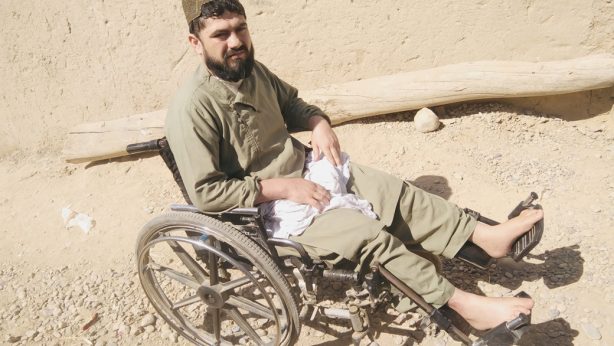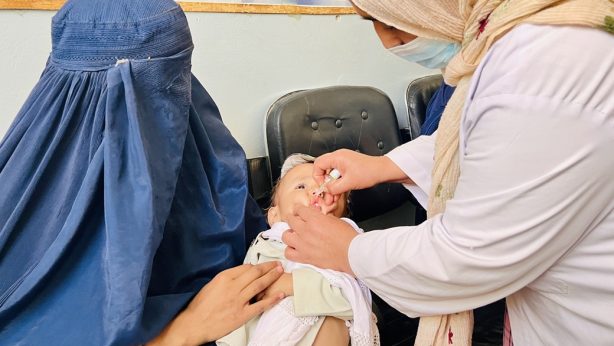Beyond Vaccines: Mothers of Kabul Speak on the Power of Hygiene

Kabul, Afghanistan – In the bustling streets of Kabul, amid the calls of vendors and the laughter of children, mothers like Maryam, Najiba, and Bahishta are quietly battling a hidden enemy. They are not only fighting the poliovirus, but also protecting their children from the myriad viruses and bacteria that threaten their health.
While vaccines are the cornerstone of protecting children from dangerous diseases like polio, these mothers believe that hygiene is also critical in safeguarding children’s well-being.
Vaccines Alone Are Not Enough
Maryam, a resident of Khair Khana and a mother of two, speaks passionately as she holds her child.
She has always ensured her children receive every vaccination, never missing a dose during any campaign.
However, Maryam believes that vaccines are only part of the solution. She emphasizes the importance of hygiene in preventing the transmission and spread of viruses and germs.
“For me, my children’s health is the most important thing. I believe that vaccines alone are not enough. Hygiene is also essential in keeping children safe from the dangers of the poliovirus and other pathogens,” Maryam says.
According to her, she always reminds her children to wash their hands with soap and water before eating and after using the restroom. This is a habit that she has instilled in them and it is something she ensures they follow consistently.
She adds that, moreover, she always boils water before cooling it for drinking, because if the water is contaminated, it can cause numerous illnesses, including polio.
Similarly, Najiba, a mother of three from the Qasaba neighborhood, also stresses the importance of hygiene alongside vaccinations.
She explains that cleanliness has become a routine part of her family’s life, and she pays special attention to it.
With a smile, she adds, “Washing hands with soap and water before meals and after using the restroom has become an unbreakable rule in our home. I have taught my children how to stay clean and take care of their bodies and clothes. I believe these habits have kept my children healthy.”
Like other mothers, Bahishta, a resident of Ahmad Shah Baba Meena, agrees that both vaccines and hygiene are crucial for protecting children’s health and preventing polio.
“We have made cleanliness a habit. I want other mothers to realize that if they want to protect their children from polio and other dangerous diseases, they must pay serious attention to their hygiene, in addition to getting them vaccinated,” she says.
 Maryam says: “For me, my children’s health is the most important thing. I believe that vaccines alone are not enough. Hygiene is also essential in keeping children safe from the dangers of the poliovirus and other harmful microbes” © Polio Free Afghanistan/2024/Hosai Ahmadzai
Maryam says: “For me, my children’s health is the most important thing. I believe that vaccines alone are not enough. Hygiene is also essential in keeping children safe from the dangers of the poliovirus and other harmful microbes” © Polio Free Afghanistan/2024/Hosai Ahmadzai
Hygiene Complements Vaccines
Health experts agree that hygiene and cleanliness play a vital role in keeping children healthy.
Dr. Sayed Fareed Shah Rafi, an internal medicine specialist, explains that hygiene means creating an environment free from disease-causing agents such as viruses, bacteria, and microbes. Handwashing, keeping the body, clothes, and home clean, drinking safe water, and eating healthy food are all essential measures in preventing the spread of diseases.
“The poliovirus is transmitted through contaminated water or food and vaccination is essential for its prevention. However, hygiene is equally important to prevent the spread and transmission of diseases,” he says.
A Broader Call to Action
The experiences of Kabul’s mothers show us that the fight to protect children from polio and other diseases does not end with vaccinations. There is also a need to build a culture of cleanliness and hygiene in society.
Maryam, Najiba and Beheshta are among the mothers who promote cleanliness and hygiene in the society by implementing this message. They show us how simply daily habits can become life-saving tools for children.
Their message is clear: vaccines and hygiene must go hand-in-hand to stop the spread of viruses, bacteria, and germs, and lead children toward a healthier future.
This is a simple yet effective strategy, and if implemented on a large scale, it could guarantee a better and healthier future for the children of this country.
By Hosai Ahmadzai, Polio Free Afghanistan


